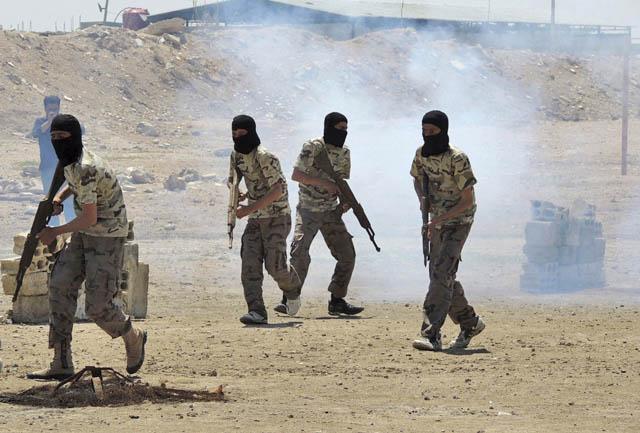You are here
Leader of Syrian militant group challenges rivals
By AP - Feb 25,2014 - Last updated at Feb 25,2014
BEIRUT — The leader of a powerful Al Qaeda-linked group in Syria gave a rival breakaway group a five-day ultimatum to accept mediation by leading clerics to end infighting or be “expelled” from the region.
The ultimatum announced in an audio recording by the leader of the Nusra Front aims to end months of deadly violence between the Islamic State of Iraq and the Levant (ISIL) and other Islamic factions. The fighting has killed hundreds of people since the beginning of the year and is undermining their wider struggle against President Bashar Assad.
It comes two days after the killing of Abu Khaled Al Suri, who had acted as Al Qaeda chief Ayman Al Zawahri’s representative in Syria. Rebels and activists believe he was assassinated by two suicide attackers from ISIL.
Both the Nusra Front and ISIL are considered terrorist organisations by the United States.
Zawahri has named the Nusra Front Al Qaeda’s branch in Syria and broken ties with the Islamic State, which has increasingly clashed with rebel brigades in opposition-held areas of Syria. The Islamic State has angered other factions with its brutal tactics and campaign to Islamise areas under its control in the northeast.
More than 2,000 people have been killed in the fighting between the Islamic State and rebel groups, including the Nusra Front.
Abu Mohammed Al Golani, the Nusra Front leader, suggested in the audio recording arbitration by clerics to stop the infighting. He warned the Islamic State that it would be driven from Syria and “even from Iraq” if it rejected the results of arbitration. He did not elaborate on how his group might do that.
“We are waiting for your official answer within five days of issuing this statement,” Golani said in the audio message posted on militant websites. “By God, if you reject God’s judgement again, and do not stop your arrogant overlording over the Muslim nation, then [we] will be forced to launch an assault against this aggressive, ignorant ideology and will expel it, even from Iraq.”
Golani suggested the arbitration be conducted by three senior Al Qaeda ideologists, including two imprisoned in Jordan and one imprisoned in Saudi Arabia. He did not say how they will handle the arbitration while they are in detention.
Syria’s conflict began with largely peaceful protests in March 2011 and gradually descended into civil war. Islamic extremists including foreign fighters have joined the war against Assad, playing an increasingly powerful role in the effort to topple him.
More than 140,000 people have died in the past three years, according to opposition activists.
On Tuesday, the chief of the United Nations relief agency supporting Palestinian refugees spoke of a rare visit he paid a day earlier to the besieged Palestinian camp of Yarmouk in Damascus.
Filippo Grandi, the commissioner general of UNRWA, said the extent of damage to the refugees’ homes in Yarmouk was shocking.
“The devastation is unbelievable. There is not one single building that I have seen that is not an empty shell by now,” he said in neighbouring Beirut.
The state of those still in the camp was even more shocking.
“It’s like the appearance of ghosts,” he said of the people coming from within Yarmouk near a distribution point he was allowed to reach.
“These are people that have not been out of there, that have been trapped in there not only without food, medicines, clean water — all the basics — but also probably completely subjected to fear because there was fierce fighting.
Grandi welcomed last week’s UN Security Council resolution calling for immediate access for humanitarian aid to all areas of Syria. He said that the resolution, unanimously adopted by the Security Council, “gives us a tool to argue in favour of access that is stronger than any other tool we’ve ever had before in Syria”.
He said it’s too early to say what effect the resolution has had on the ground, but that “everybody has to comply”. Both sides have hindered access in the past, he added.
UNRWA shipments to Yarmouk were cut for months, leaving residents to suffer from crippling shortages of food and medicine. Since last month, small shipments resumed, although they remain intermittent.
More than 100 people have died in the area since mid-2013 as a result of starvation and illnesses exacerbated by hunger or lack of medical aid, according to UN figures.
Yarmouk, located in southern Damascus, is the largest of nine Palestinian camps in Syria. Since the camp’s creation in 1957, it has evolved into a densely populated residential district just eight kilometres from the centre of Damascus. Several generations of Palestinian refugees have lived there.
Grandi said around 18,000 of the camp’s original 160,000 Palestinian refugees are still inside Yarmouk.
Related Articles
A rogue Iraqi offshoot of Al Qaeda is now killing more rival Al Qaeda fighters every week in Syria than President Bashar Assad’s forces as infighting intensifies among opposition gunmen.
Daesh fighters seized most of a Palestinian camp on the outskirts of the Syrian capital Damascus on Wednesday, nearing President Bashar Al Assad's seat of power.
The leader of radical Sunni fighters who have made rapid military advances in Iraq is the rising star of global jihad, driven, Islamist fighters say, by an unbending determination to fight for and establish a hardline Islamic state.
















